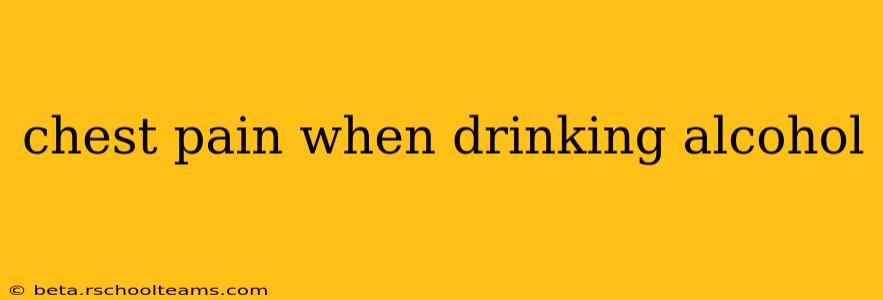Experiencing chest pain after drinking alcohol can be alarming. While sometimes it's a minor issue, it can also signal a serious underlying medical condition. This comprehensive guide explores the various reasons why you might feel chest pain after consuming alcohol, helping you understand when to seek immediate medical attention and how to best manage this concerning symptom.
Why Does My Chest Hurt After Drinking Alcohol?
The connection between alcohol consumption and chest pain isn't always straightforward. Several factors can contribute, ranging from relatively benign causes to life-threatening emergencies.
1. Acid Reflux (Gastroesophageal Reflux Disease or GERD): Alcohol relaxes the lower esophageal sphincter, the muscle that prevents stomach acid from flowing back into the esophagus. This can lead to heartburn and chest pain, often mistaken for a heart attack. The burning sensation might radiate to the chest and be worse after consuming acidic or carbonated alcoholic beverages.
2. Heart Problems: Alcohol can significantly impact your heart health. Heavy drinking can lead to conditions like cardiomyopathy (weakening of the heart muscle), arrhythmias (irregular heartbeats), and even heart attacks. Chest pain associated with heart problems is often described as pressure, tightness, or squeezing, sometimes radiating to the arm, jaw, or back. This warrants immediate medical attention.
3. Panic Attacks: Alcohol can trigger or exacerbate anxiety, sometimes resulting in panic attacks. These attacks can manifest with chest pain or tightness, rapid heartbeat, shortness of breath, and dizziness. The chest pain in this case is usually related to the intense anxiety and hyperventilation.
4. Esophageal Spasms: Alcohol can irritate the esophagus, causing it to spasm. These spasms can generate intense chest pain, feeling like a sudden, sharp, or crushing sensation.
5. Gallbladder Issues: Alcohol can stimulate the gallbladder to contract, potentially causing pain if you have gallstones or other gallbladder problems. This pain is often located in the upper right abdomen but can sometimes radiate to the chest.
6. Muscle Strain or Injury: While less common, strenuous activity after alcohol consumption can lead to muscle strain in the chest area, resulting in pain. Dehydration from alcohol can also exacerbate this.
7. Medication Interactions: Certain medications can interact negatively with alcohol, increasing the risk of chest pain or other adverse effects. Always check the label and consult your doctor or pharmacist about potential interactions.
What If I Have Chest Pain After Drinking? When Should I Go to the Doctor?
Chest pain should never be ignored, especially if it occurs after alcohol consumption. Seek immediate medical attention if you experience:
- Sudden, severe chest pain: This is a critical symptom that could indicate a heart attack or other life-threatening condition.
- Chest pain accompanied by shortness of breath, dizziness, or sweating: These are additional warning signs requiring urgent medical evaluation.
- Pain that radiates to your arm, jaw, neck, or back: This is characteristic of a heart attack.
- Chest pain that persists or worsens despite rest and over-the-counter medications: This indicates that the cause might be more serious.
How Can I Prevent Chest Pain After Drinking Alcohol?
- Moderate your alcohol intake: Limiting alcohol consumption is the most effective way to reduce the risk of chest pain and other alcohol-related problems.
- Drink responsibly: Avoid binge drinking and pace your alcohol consumption.
- Stay hydrated: Drink plenty of water to counteract the dehydrating effects of alcohol.
- Avoid acidic and carbonated drinks: These can worsen acid reflux.
- Eat before and while drinking: Food helps to slow alcohol absorption.
- Know your limits: Be aware of your tolerance for alcohol and avoid drinking beyond your limits.
- Consult your doctor: If you experience recurrent chest pain after drinking, discuss it with your doctor to rule out any underlying medical conditions.
Disclaimer: This information is for educational purposes only and does not constitute medical advice. Always consult a healthcare professional for any health concerns or before making any decisions related to your health or treatment.
